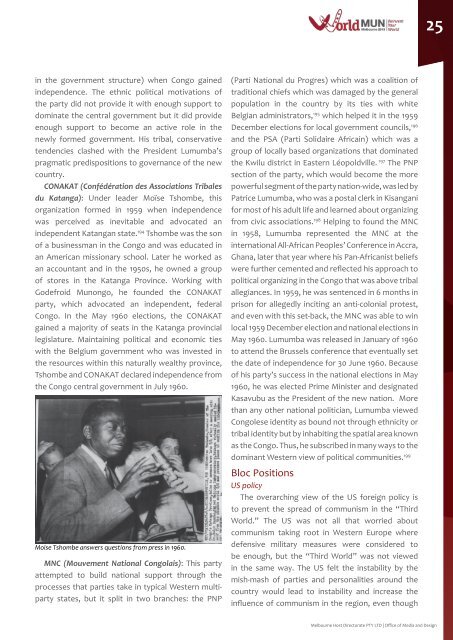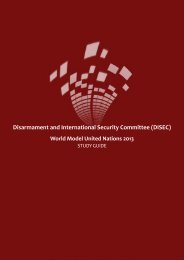Historical Security Council - World Model United Nations
Historical Security Council - World Model United Nations
Historical Security Council - World Model United Nations
Create successful ePaper yourself
Turn your PDF publications into a flip-book with our unique Google optimized e-Paper software.
in the government structure) when Congo gained<br />
independence. The ethnic political motivations of<br />
the party did not provide it with enough support to<br />
dominate the central government but it did provide<br />
enough support to become an active role in the<br />
newly formed government. His tribal, conservative<br />
tendencies clashed with the President Lumumba’s<br />
pragmatic predispositions to governance of the new<br />
country.<br />
CONAKAt (Confédération des Associations tribales<br />
du Katanga): Under leader Moïse Tshombe, this<br />
organization formed in 1959 when independence<br />
was perceived as inevitable and advocated an<br />
independent Katangan state. 194 Tshombe was the son<br />
of a businessman in the Congo and was educated in<br />
an American missionary school. Later he worked as<br />
an accountant and in the 1950s, he owned a group<br />
of stores in the Katanga Province. Working with<br />
Godefroid Munongo, he founded the CONAKAT<br />
party, which advocated an independent, federal<br />
Congo. In the May 1960 elections, the CONAKAT<br />
gained a majority of seats in the Katanga provincial<br />
legislature. Maintaining political and economic ties<br />
with the Belgium government who was invested in<br />
the resources within this naturally wealthy province,<br />
Tshombe and CONAKAT declared independence from<br />
the Congo central government in July 1960.<br />
Moise Tshombe answers questions from press in 1960.<br />
MNC (Mouvement National Congolais): this party<br />
attempted to build national support through the<br />
processes that parties take in typical Western multiparty<br />
states, but it split in two branches: the PNP<br />
(Parti National du Progres) which was a coalition of<br />
traditional chiefs which was damaged by the general<br />
population in the country by its ties with white<br />
Belgian administrators, 195 which helped it in the 1959<br />
December elections for local government councils, 196<br />
and the PSA (Parti Solidaire Africain) which was a<br />
group of locally based organizations that dominated<br />
the Kwilu district in Eastern Léopoldville. 197 the PNP<br />
section of the party, which would become the more<br />
powerful segment of the party nation-wide, was led by<br />
Patrice Lumumba, who was a postal clerk in Kisangani<br />
for most of his adult life and learned about organizing<br />
from civic associations. 198 Helping to found the MNC<br />
in 1958, Lumumba represented the MNC at the<br />
international All-African Peoples’ Conference in Accra,<br />
Ghana, later that year where his Pan-Africanist beliefs<br />
were further cemented and reflected his approach to<br />
political organizing in the Congo that was above tribal<br />
allegiances. in 1959, he was sentenced in 6 months in<br />
prison for allegedly inciting an anti-colonial protest,<br />
and even with this set-back, the MNC was able to win<br />
local 1959 December election and national elections in<br />
May 1960. Lumumba was released in January of 1960<br />
to attend the Brussels conference that eventually set<br />
the date of independence for 30 June 1960. Because<br />
of his party’s success in the national elections in May<br />
1960, he was elected Prime Minister and designated<br />
Kasavubu as the President of the new nation. More<br />
than any other national politician, Lumumba viewed<br />
Congolese identity as bound not through ethnicity or<br />
tribal identity but by inhabiting the spatial area known<br />
as the Congo. Thus, he subscribed in many ways to the<br />
dominant Western view of political communities. 199<br />
Bloc Positions<br />
US policy<br />
The overarching view of the US foreign policy is<br />
to prevent the spread of communism in the “Third<br />
<strong>World</strong>.” The US was not all that worried about<br />
communism taking root in Western Europe where<br />
defensive military measures were considered to<br />
be enough, but the “Third <strong>World</strong>” was not viewed<br />
in the same way. The US felt the instability by the<br />
mish-mash of parties and personalities around the<br />
country would lead to instability and increase the<br />
influence of communism in the region, even though<br />
25<br />
Melbourne Host Directorate PTY LTD | Office of Media and Design
















